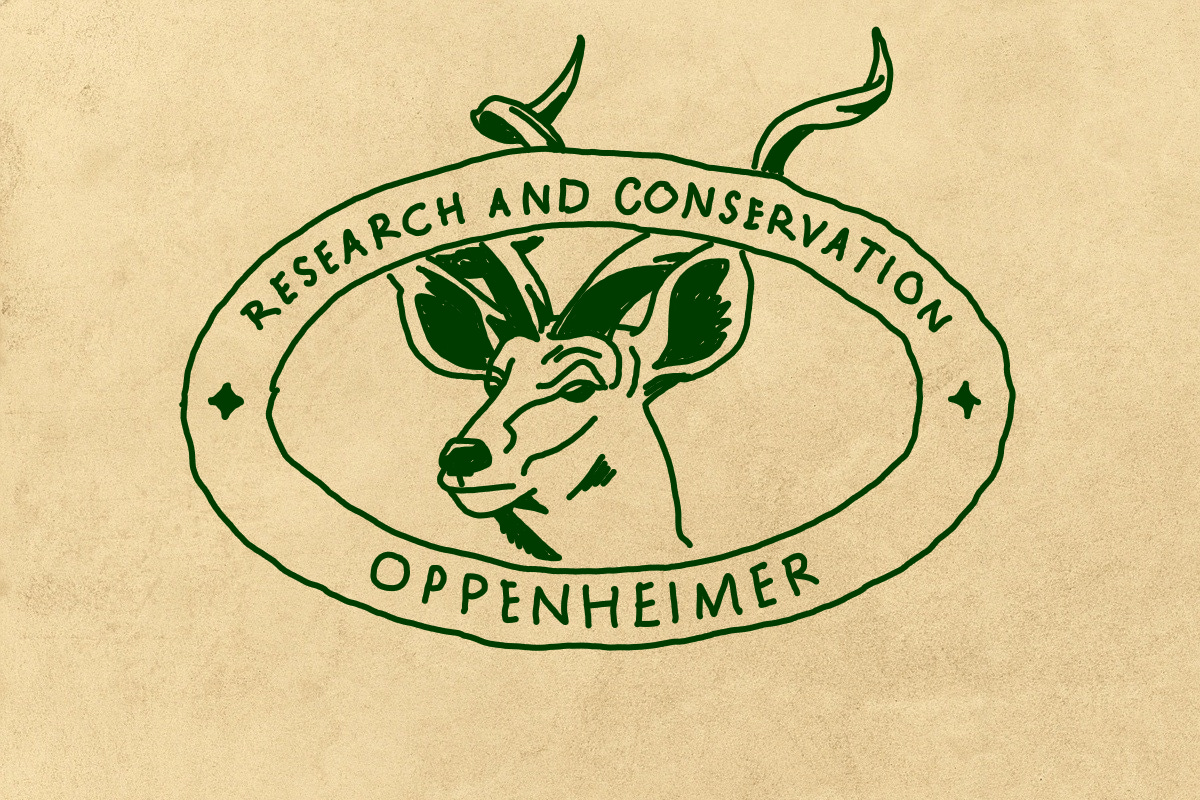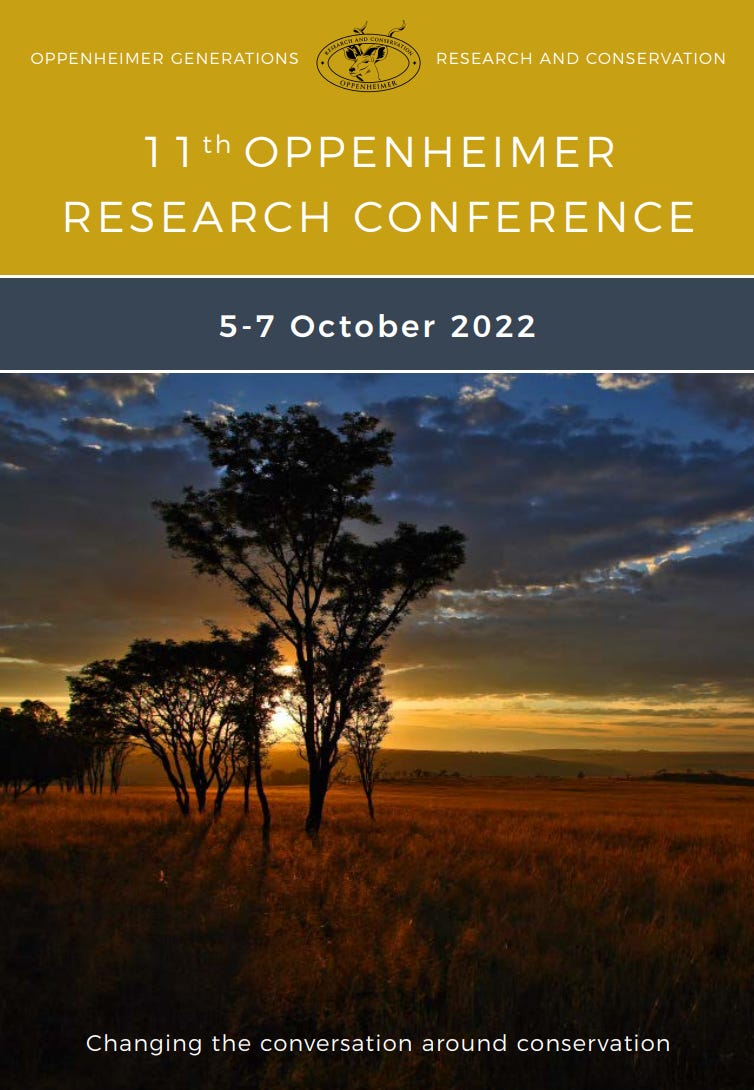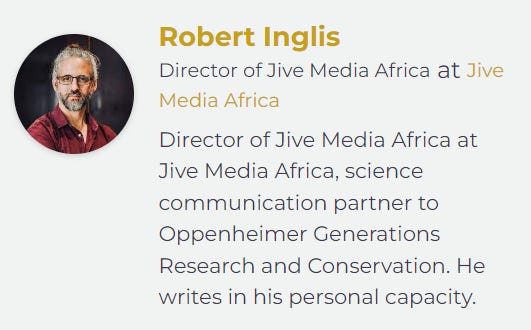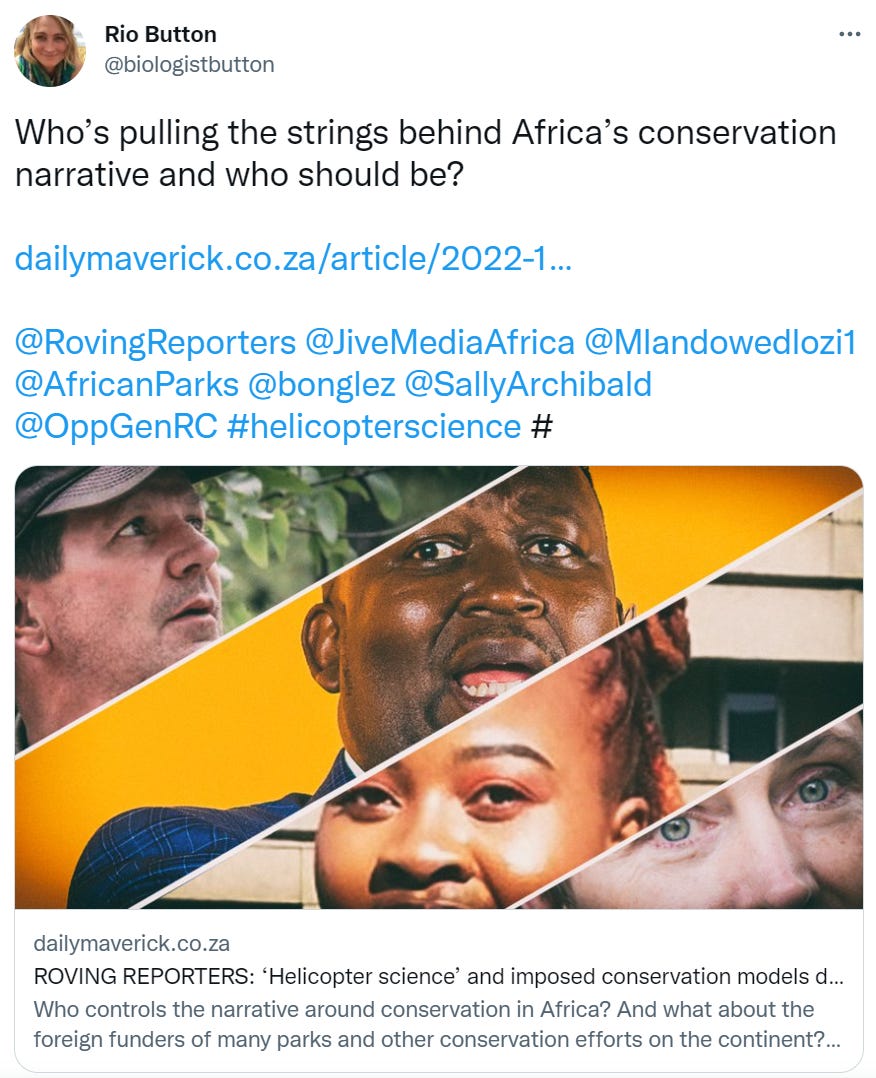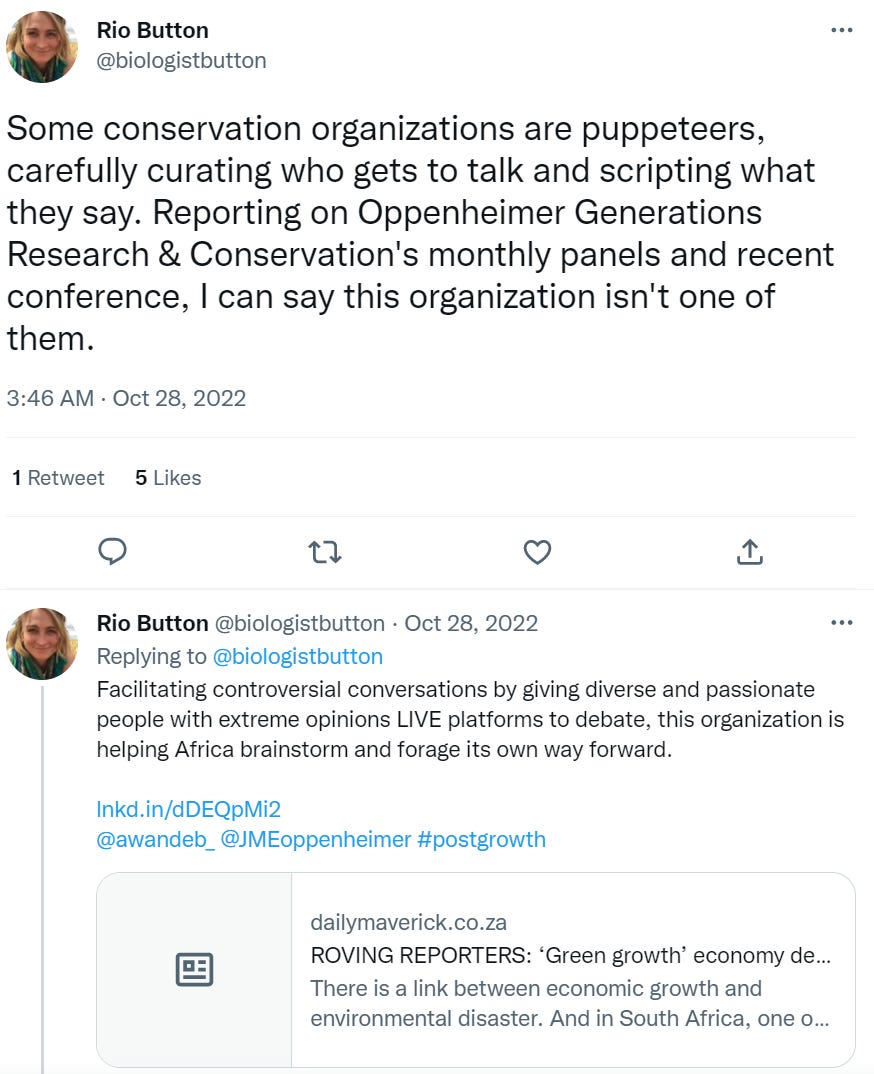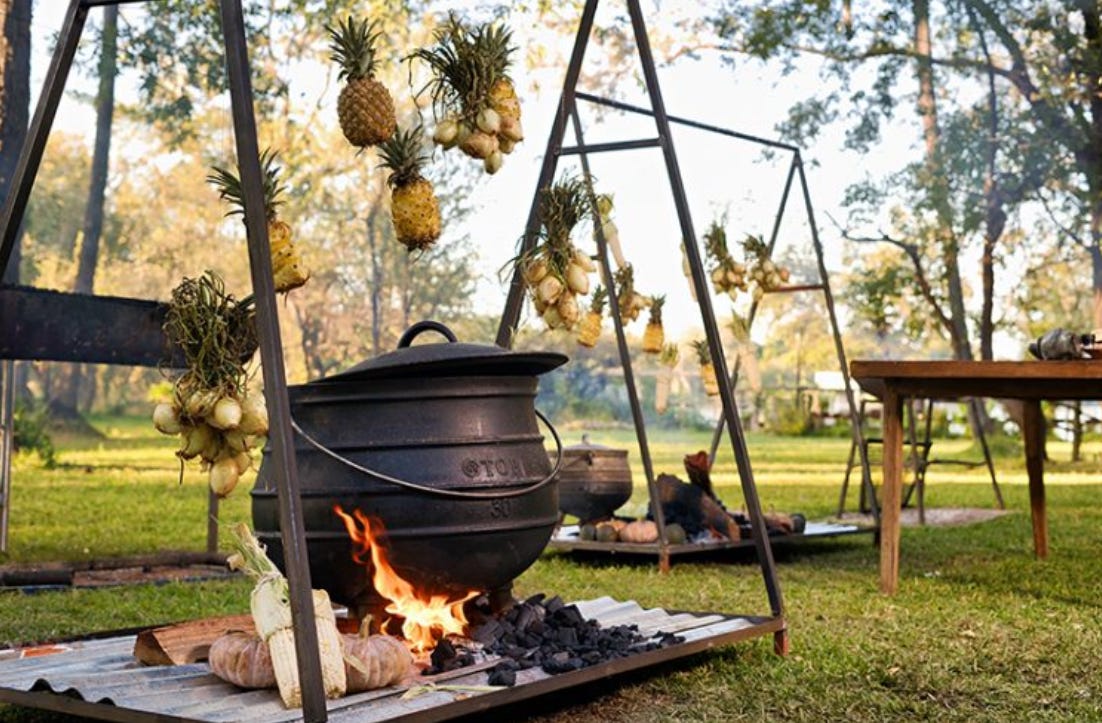Oppenheimer Generations Research and Conservation, a foundation run by South Africa’s billionaire Oppenheimer family, is engaged in a disingenuous public relations scheme under the guise of independent journalism and science communication. The scheme appears to be an attempt to legitimize the Oppenheimer conservation ecosystem and the wildlife economy in which the family is financially invested.
The use of ‘independent’ journalists and ‘science communicators’ for public relations
Daily Maverick published a slew of public relations articles for OGRC in 2022. One such article titled ‘Helicopter science’ and imposed conservation models disregard African environmental knowledge summarized a panel discussion from the 11th Oppenheimer Research Conference about how governments, corporations, and powerful groups in Europe and North America were dictating conservation in Africa.
The discussion was on par for the conference’s theme, “Changing the conversation around conservation.” Panelist and journalist Bongani Bingwa “warned of governments and corporations hoodwinking the media, and implored African journalists “to follow the money” when unravelling the complexities beneath conservation and climate stories.”
I took Bingwa’s advice and followed the money of the ‘Helicopter science’ article.
The article was written by Rio Button, Matthew Hattingh, and Fred Kockott for Roving Reporters, an organization that describes itself as “Authentic – Credible – Independent.”
But the keen-eyed will notice that the bottom of the article stated that the article was commissioned by Jive Media Africa, the “science communication partner to Oppenheimer Generations Research and Conservation.”
There are many articles published in Daily Maverick that follow this pattern – written by Roving Reporters, commissioned by Jive Media Africa, partnered with OGRC. Readers ignorant of these connections have been hoodwinked into believing that the articles are being written by independent journalists with no ulterior motive.
The articles, however, are nothing more than a public relations campaign meant to market OGRC as a legitimate voice in African conservation.
Button, one of the authors and a science communicator, shared the article on Twitter, asking, “Who’s pulling the strings behind Africa’s conservation narrative and who should be?” Unsurprisingly, Button was retweeted by OGRC.
Button also tweeted, “Some conservation organizations are puppeteers, carefully curating who gets to talk and scripting what they say. Reporting on Oppenheimer Generations Research & Conservation's monthly panels and recent conference, I can say this organization isn't one of them.” She went on to say that OGRC was “helping Africa brainstorm and forage its own way forward.”
The extremely peculiar thing about that tweet was that it was not directed to anyone nor was it in response to anything. I bet those boots taste great!
OGRC enjoyed most of the attention in the articles, but other pseudo-conservation organizations that service the Oppenheimer family, like African Wildlife Economy Institute and African Leadership University School of Wildlife Conservation, also benefited from this public relations work. Button, Kottoch, and another journalist teamed up to write an article titled Hunting and wildlife trade will save our wildlands, not CITES trade bans – experts argue that detailed an OGRC webinar produced by Jive Media Africa.
A spotlight was directed onto AWEI Board Member Brian Child, ALU SOWC Research Director Sue Snyman, and AWEI Research Fellow Michael ‘t Sas-Rolfes. The article advanced the arguments of the three sustainable use activists and positively portrayed trophy hunting, wildlife ranching, privatization, and property rights in regards to the wildlife economy.
I’m not sure what’s worse – doing public relations for billionaires or describing Michael ‘t Sas-Rolfes as an “expert.”
The use of the ‘wildlife economy’ to further enrich the Oppenheimer family
The Oppenheimer family made their billions through the De Beers diamond mining company. The family sold their controlling stake of the company following the 2008 recession planned to use the money to invest in more profitable enterprises in Southern Africa according to a report based on Oppenheimer interviews.
Enter the wildlife economy.
Since 2012, Shangani Holistic, an Oppenheimer-owned company in Zimbabwe, has been ranching indigenous cattle and managing wildlife “consumptively” through trophy hunting and wildlife trade. There are 8,000 cattle on the ranch used to meet UK demand for beef but OGRC mainly focuses its public relations on the sustainable use of the ranch’s wildlife.
Oppenheimer Generations, the umbrella foundation for the Oppenheimer family, hosts an annual Taste of Game festival that “seeks to preserve Africa’s wildlife meat sector.” The festival has been featured in food and lifestyle journals where readers can delight in the fanciful photos of delicious fare.
The marketing copy reads, “As means to highlight the role of wildlife and the wildmeat sector in Africa – this year, the African Wildlife Economy Institute (AWEI), together with Oppenheimer Generations Research and Conservation, Jan Hendrik van der Westhuizen and Shangani Holistic aim to support the development of an inclusive and sustainable venison sector in Africa that benefits both people and nature.”
All of the organizations involved represent different parts of the same Oppenheimer conservation ecosystem. Even the chef, van der Westhuizen, works at a restaurant in Tswalu Kalahari, an Oppenheimer-owned luxury private game reserve.
“[AWEI] is working closely with Oppenheimer Generations Research and Conservation to develop multidisciplinary thought leadership on wildlife economies. Developing a sustainable and inclusive game meat sector in Africa, for example, requires the inputs of business sciences, economics, law, and conservation ecology.” – Dr Franci Vorhies, AWEI Director
Interestingly, the Oppenheimer Generations philosophy is that they “invest in early-stage opportunities that create inclusive sustainable growth across the continent.” Also noteworthy, Jive Media Africa Founder and Director Robert Inglis has #inclusivity and #sustainability” in his Twitter profile.
Notice the pattern of ultra-wealthy people and their bootlicking companions using the words “inclusive” and “sustainable” to describe their work?
[And wouldn’t you know it? Inclusive Conservation Group ran a multimillion-dollar disinformation campaign promoting sustainable use! Read more about that here.]
“The game industry is diverse and has seen unprecedented growth, however, more could be done to mainstream the sustainable use of game in Africa. Taste of Game aims to profile game with the consumer, and encourage a greater demand for healthier, GMO-free, low-fat protein. The increased supply and demand of venison and participation in the sector – particularly from rural communities speaks to a future that will contribute to rural economic development, job creation, and food security.” – Dr Duncan MacFadyen, Head of Oppenheimer Generations Research and Conservation
It’s easy to see why MacFadyen would want to mainstream sustainable use.
Billionaire family invests in sustainable use.
Billionaire family pays people that have a PhD to promote sustainable use.
Very simple.
[MacFadyen’s argument sounds awfully similar to the “hunter advocacy” program that IUCN SULi is engaged. Read more about that here.]
OGRC published an article titled Conversations from Taste of Game: Is game meat the next game changer? written by Tatjana Baleta, another self-professed science communicator. The article fawned over last year’s Taste of Game festival and the potential of the wildlife economy.
“Game ranchers, researchers, Zambia and Zimbabwe’s Ministers of Tourism, journalists and influencers joined OGRC for dinner and discussion about the wildlife economy, and game meat in particular. The wildlife economy “uses wildlife, plants and animals (marine and terrestrial), as an economic asset to create value that aligns with conservation objectives and delivers sustainable growth and economic development.” – Tatjana Baleta
I think it’s safe to say that Baleta made an unnecessary distinction between journalists and influencers, in this case. They are two of the same when it comes to the Oppenheimer conservation ecosystem.
Bingwa called on journalists “to follow the money.” Unfortunately, it seems many journalists are too busy taking the money.




